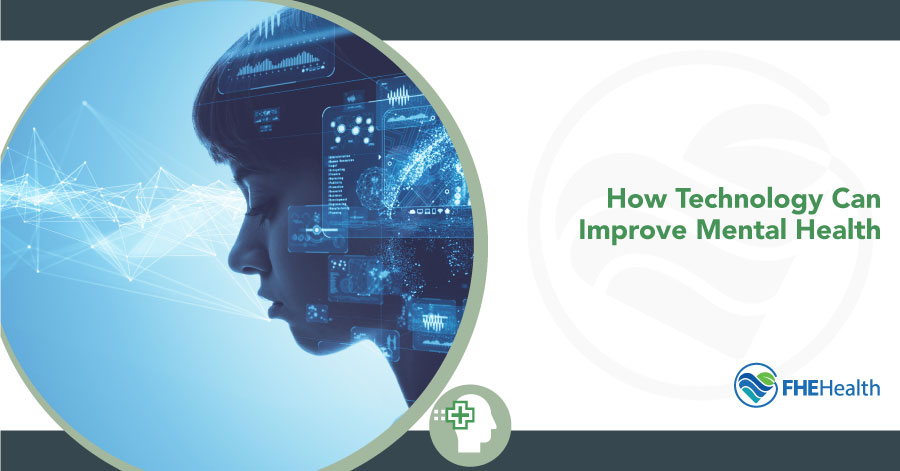
For many years, conversations about technology centered around entertainment. It’s not uncommon to hear people talk about too much TV or internet time causing attention disorders and unhealthy bodies due to lack of exercise. Yet, technology is improving mental health. In many ways, we are seeing health breakthroughs occurring as a result of using the right type of technology in the best manner.
Using the same tech found in video games, electronics, and computers, doctors are finding ways to improve mental health disorders, giving people a higher quality of life without the use of medications — or at least as a complement to them. This has also helped increase what we know about mental health, including our understanding of the functions of the brain.
5 Technology and Health Breakthroughs Changing Mental Health Treatment
Medical breakthroughs happen every day. Everything from artificial hearts to limbs are being created to help people function and live longer, healthier lives. Technology for mental health is also growing, both in day-to-day interactions and in treatment.
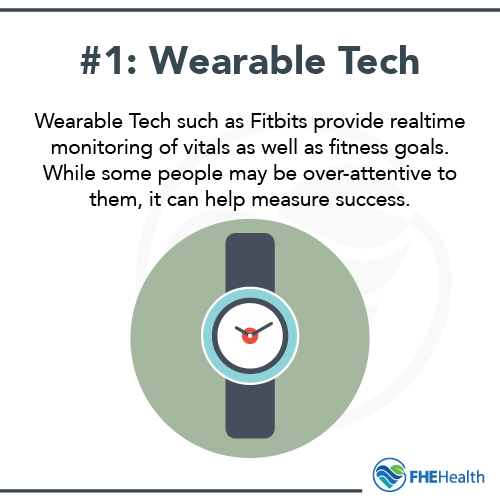 1. The Fitbit
1. The Fitbit
The Fitbit is one such example. Although some people with addictive personalities may overuse them, this tool has helped to create more awareness for many people. It can help someone reach their fitness goals, which can boost endorphins and help them feel good about themselves. It also allows for a significant improvement in overall quality of life, giving a person with anxiety or depression more balanced hormones and possibly limiting symptoms.
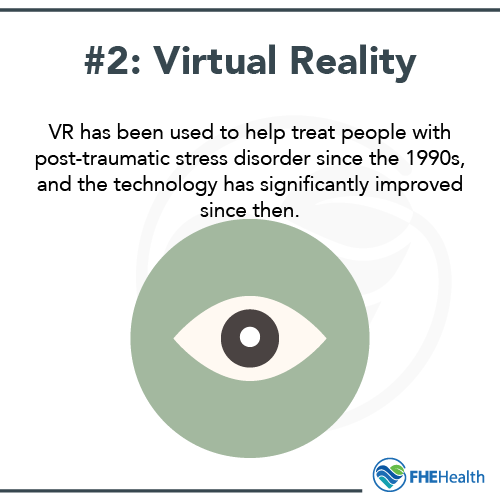 2. Virtual Reality
2. Virtual Reality
There’s also evidence that virtual reality could play a role in improving mental health. In the past, some experts believed that VR would damage the brain, but today we know that’s not the case. It has been used to help treat people with post-traumatic stress disorder since the 1990s, and the technology has significantly improved since then. Today, we can see it being used to treat teen depression, claustrophobia, alcohol addiction and eating disorders, according to Scientific American.
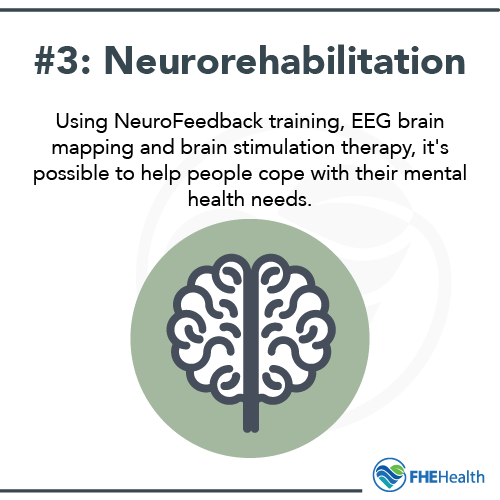 3. Neuro Rehabilitation
3. Neuro Rehabilitation
Using NeuroFeedback training, EEG brain mapping and brain stimulation therapy, it’s possible to help people cope with their mental health needs. These types of neurorehabilitation are designed to stimulate areas of the brain that are damaged or not working properly. They can help people who are dealing with withdrawal from addiction or improve many psychological problems. This is a unique opportunity to better understand the underlying cause of mental health disorders while providing more advanced treatment.
- Neurofeedback training works to outline and execute the steps necessary to recover from substance use disorder and psychological problems.
- EEG brain mapping monitors the brain’s electrical activity to find any areas outside of the normal function. This allows doctors to understand the potential cause of the problem so they can apply effective treatment.
- Brain stimulation therapy uses vibration, magnetic and electrical stimulation to encourage the brain to heal naturally, including overcoming areas of dysfunction. This works well for conditions such as withdrawal symptoms.
These treatments, while currently being used at FHE Health, continue to improve and are more readily accessible to those in need. They provide advanced treatment and complement the additional mental health and substance use disorder care we offer.
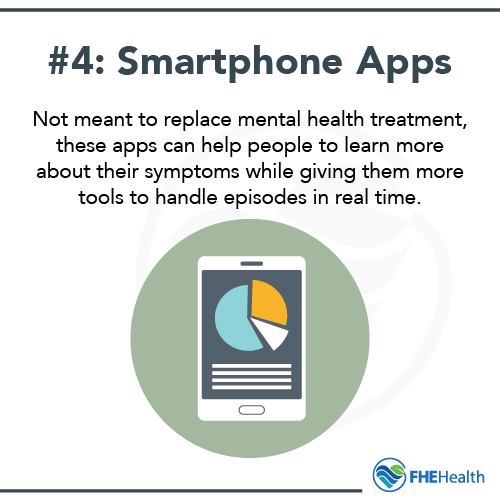 4. Smartphone Applications
4. Smartphone Applications
Another interesting way that people are benefiting from technology is through the use of smartphone apps. Though parents may still want to limit a child’s access to games, some apps are helping people of all ages to cope better with depression and anxiety. Not meant to replace mental health treatment, these apps can help people to learn more about their symptoms while giving them more tools to handle episodes in real-time.
One key benefit of apps is that they let people share what’s worked for them in an open setting. For example, some patients may share stories about their history that led to their mental health disorders. Then, others can offer insight into how they cope or calm themselves. This is a hands-on solution for immediate needs.
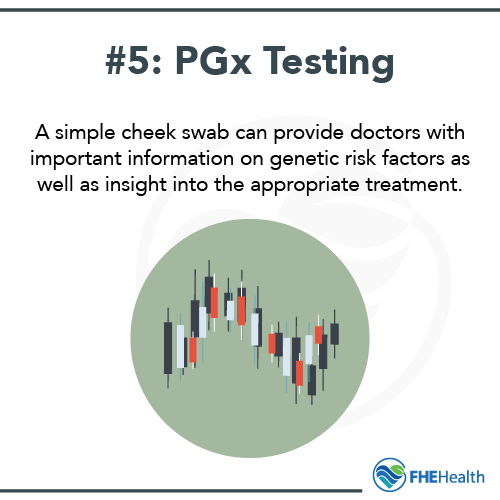 5. Psychiatric Pharmacogenomic Testing
5. Psychiatric Pharmacogenomic Testing
Psychiatric pharmacogenomic testing (PGX testing) is a highly useful tool in the mental health profession. It’s a gene testing method that is designed to understand better who is at risk of various mental health and medical conditions. Though the testing process used to take a long time and numerous procedures, today, it’s far more accessible. A simple cheek swab can provide doctors with important information on genetic risk factors as well as insight into the appropriate treatment.
A key example of the benefits of PGX testing occurs in dual-diagnosis situations. When a person has both mental health disorders, such as anxiety or depression, and substance use disorders, it’s hard for doctors to know what happened first and, therefore, which treatment is best. With this testing, it’s possible to see more of the underlying cause.
The First Step Is to Seek Care
These new breakthroughs are just a few of the innovations for mental health treatment available today. For men and women who recognize that they have mental health disorders or may need help but have not wanted to pursue treatment for fear of medication or stigma, these technologies can reduce some of those risks.
The first step is to seek care. That means taking the time to reach out to a provider who can offer proper diagnostic tools. While some self-help can provide support in the middle of a panic attack, long-term benefits for better health with technology generally come from a doctor or therapist as a first step. Luckily, this type of help is becoming more readily available.
Take Advantage of the Innovations for Mental Health by Reaching Out to Us
At FHE Health, we incorporate many of these and other technological breakthroughs in the work we do to help those with mental health disorders and substance use disorders. Take that first step yourself. Call to speak to our compassionate counselors for immediate assistance. Reach out to us 24/7 at 833-596-3502.






